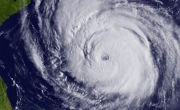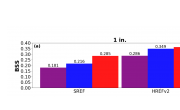Spring 2020 | Dr. Jun Zhang, a scientist from the University of Miami and visitor to the DTC in 2018, investigated the impact of model physics on the forecast performance of hurricane models for hurricanes undergoing rapid intensification (RI). Accurate predictions of hurricane intensity could significantly reduce the economic loss, especially if a hurricane makes landfall at well-developed coastal regions. Hurricane intensity is influenced not only by environmental factors but also by internal dynamics and thermodynamics. Previous… Read More
Visitors: Evaluating the Impact of Model Physics on Forecasts of Hurricane Rapid Intensification
Visitor: Jun Zhang

Community Connections: Communication and Outreach in the Unified Forecast System
Spring 2020 | The Unified Forecast System (UFS) is a coupled, comprehensive Earth modeling and data assimilation system that will be used in NOAA operations and by the research community. There are naturally a lot of questions about UFS from potential collaborators, for example: What UFS codes are available to run? How do I find out more information about the project, and how can I get involved? One of the roles of the UFS Communication and Outreach Working Group (C&O WG, for short) is to communicate the answers to such questions… Read More
Did you know?: CCPP Framework
Is to be Used for Future Atmospheric Chemistry Modeling at NCAR
Spring 2020 | The Atmospheric Chemistry Observations and Modeling laboratory at NCAR has been developing the Model Independent Chemistry Module (MICM) to represent chemical transformations in any atmosphere model. To make this happen, MICM is designed to work with the Common Community Physics Package (CCPP) Framework, a software defining how host models access physics parameterizations including chemistry. MICM gathers information on trace gases and chemical reactions from a database (coined the “Chemistry Café”). It then configures… Read More
Announcement: The First Unified Forecast System (UFS) Users’ Workshop To Be Held Virtually
New Deadlines Posted

2020-04-28 | Due to the current situation regarding COVID-19, the first Unified Forecast System (UFS) Users’ Workshop will be held virtually online, from 27-29 July, 2020. The aim of the workshop remains to establish an annual forum to exchange ideas, advance education on applying the UFS, and embrace the full potential of the community to support and help improve the UFS modeling and prediction system. A diverse group of participants from across the weather enterprise are encouraged to participate and engage in this forum, with the… Read More
Software Release: Announcing UPP V4.1 Release

2020-03-31 | The Developmental Testbed Center (DTC) is pleased to announce the release of the Unified Post Processor Version 4.1. While many of the functionalities and supported features remain the same as previous versions, there are significant modifications that support a larger goal to further align the community distributed code with National Oceanic Atmospheric Administration (NOAA) operations. The changes to the UPP in the current release reflect this effort and can be viewed as a transitional phase as work continues toward… Read More
Software Release: Bundle CCPP+SCM v4 public release

2020-03-16 | The Developmental Testbed Center is pleased to announce the Common Community Physics Package (CCPP) v4.0.0 public release on March 16, 2020. The CCPP contains a library of physical parameterizations (CCPP-Physics), and the framework that connects it to host models (CCPP-Framework). This release also includes the CCPP Single Column Model (SCM) v4.0.0. Five experimental cases are available for use with the CCPP SCM: BOMEX maritime shallow convection, LASSO continental shallow convection, ASTEX stratocumulus-to-cumulus… Read More
Software Release: METplus version 3.0, MET version 9.0, and METviewer version 3.0

2020-03-16 | The Model Evaluation Tools (MET) development team at the DTC is pleased to announce the release of a multi-component verification capability called METplus. It includes METplus version 3.0, MET version 9.0 and METviewer version 3.0. METplus contains a suite of Python wrappers and ancillary scripts to enhance the user's ability to quickly set-up and run MET. METviewer is a database and display system for aggregating and plotting MET output. Users can now check everything out and build… Read More
Announcement: UFS Users' Workshop

2020-01-10 | The first Unified Forecast System (UFS) Users’ Workshop will take place on July 27-29, 2020 at NCAR's Center Green Campus in Boulder, Colorado, with the aim to establish an annual forum to exchange ideas, advance education on applying the UFS, and embrace the full potential of the community to support and help improve the UFS modeling and prediction system. It will feature lively engagement and discussions with diverse groups of participants from across the Weather Enterprise including public… Read More
Announcement: AMS 2020
Autumn 2019 | 100th AMS Annual Meeting in historic Boston, Massachusetts, from 12 to 16 January 2020
Lead Story: An Overview of the Earth Prediction Innovation Center (EPIC)

Autumn 2019 | The Earth Prediction Innovation Center, or “EPIC,” will advance Earth system modeling skills, reclaim and maintain international leadership in Earth system prediction, and improve the transition of research to operations (R2O) and operations to research (O2R) within NOAA by working closely with partners across the weather enterprise. EPIC’s legislative language is included as an amendment to the Weather Research and Forecasting Innovation Act (WRFIA) of 2017 (Public Law 115-25… Read More
Director's Corner: A NOAA-NCAR Collaboration Toward Unified Modeling
Chris Davis

Autumn 2019 | What does unified modeling mean to you? Perhaps an obvious meaning is that “unified” implies one single model: one choice for dynamics, physics, data assimilation, and postprocessing. Everyone uses the same code: universities, private companies, research labs, and operational prediction centers. It is a grand vision. As a community, we are not there yet. I argue that there is a more practical, and potentially more useful definition of unified modeling: codes are easily shared and interoperable. Why do I say this? At… Read More
Who's Who: Kate Fossell
Autumn 2019 | Tell us a little about yourself and your career path. I’m a Wisconsin native and grew up fascinated by severe storms. Naturally, when it came time to think about college, I looked for meteorology programs in the midwest. I settled on Saint Louis University for my B.S. in Atmospheric Sciences and then earned my M.S. in Mathematics from the University of Wisconsin - Milwaukee (UWM). After graduation, I stayed on at UWM as a researcher while also working for a UWM-affiliated meteorological consulting company called… Read More
Visitors: Using Machine Learning to Post-Process Ensemble-based Precipitation Forecasts
Visitor: Eric Loken

Autumn 2019 | Ensembles are useful forecast tools because they account for uncertainties in initial conditions, lateral boundary conditions, and/or model physics, and they provide probabilistic information to users. However, many ensembles suffer from under-dispersion, sub-optimal reliability, and systematic biases. Machine learning (ML) can help remedy these shortcomings by post-processing raw ensemble output. Conceptually, ML identifies (nonlinear and linear) patterns in… Read More
Community Connections: Container & CCPP AMS Short Courses
Autumn 2019 | One of the primary goals of the DTC is to provide software and infrastructure that aid in transitions between the research and operational communities. The American Meteorology Society (AMS) provides an ideal venue for sharing these tools with the community through the AMS short course offerings at the Annual Meeting. The DTC is looking forward to presenting two short courses at the 100th AMS Annual Meeting in Boston, MA in January 2020. “Integrating Numerical Weather Prediction (NWP) System Components… Read More
Pagination
Copyright © 2026. All rights reserved.